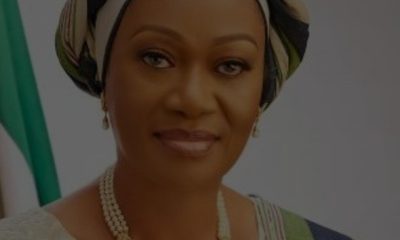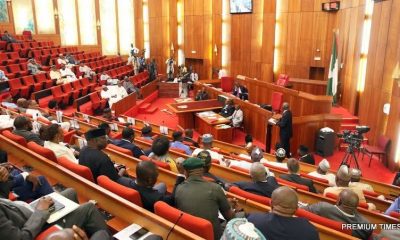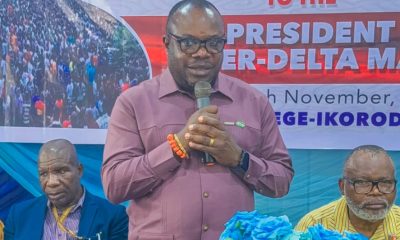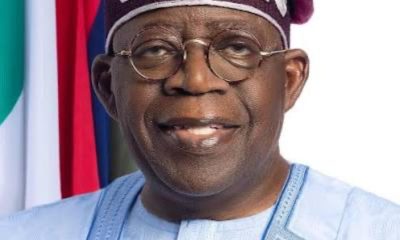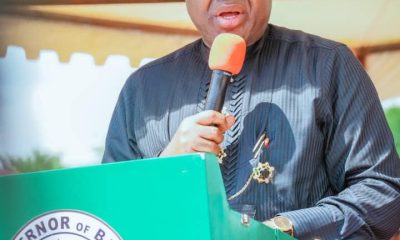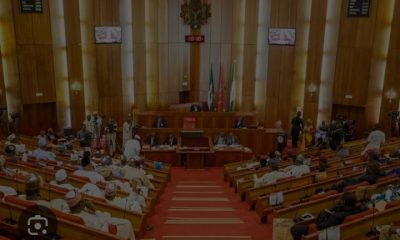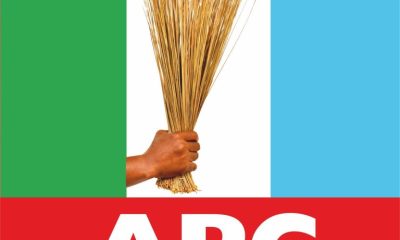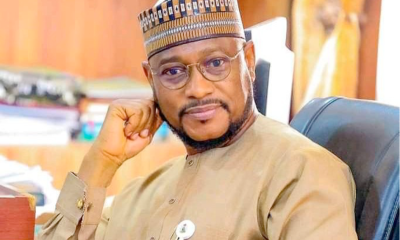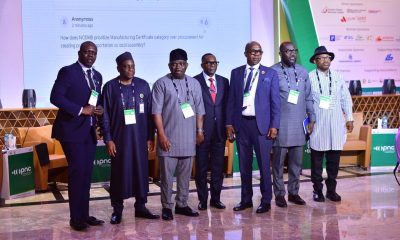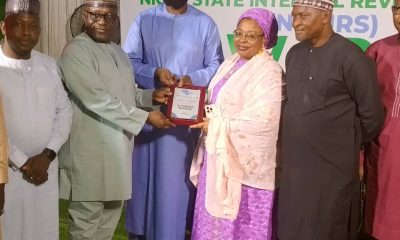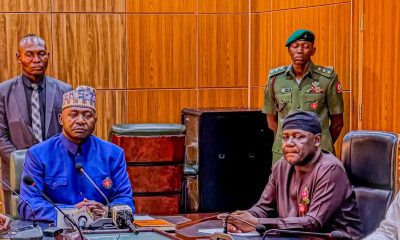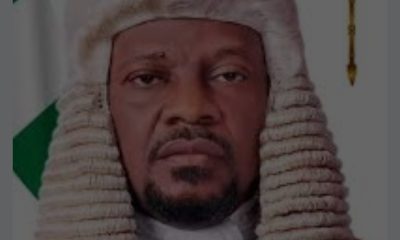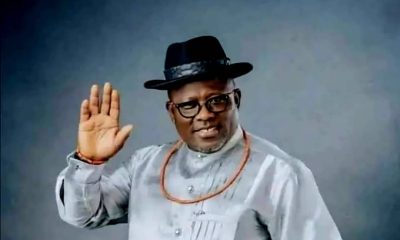Politics
Peace Finally Returns to Rivers As Wike, Fubara Make First Public Outing After Reconciliation •Fubara addresses supporters, says no sacrifice is too big for peace •Residents react, fume at absence of Sim’s supporters
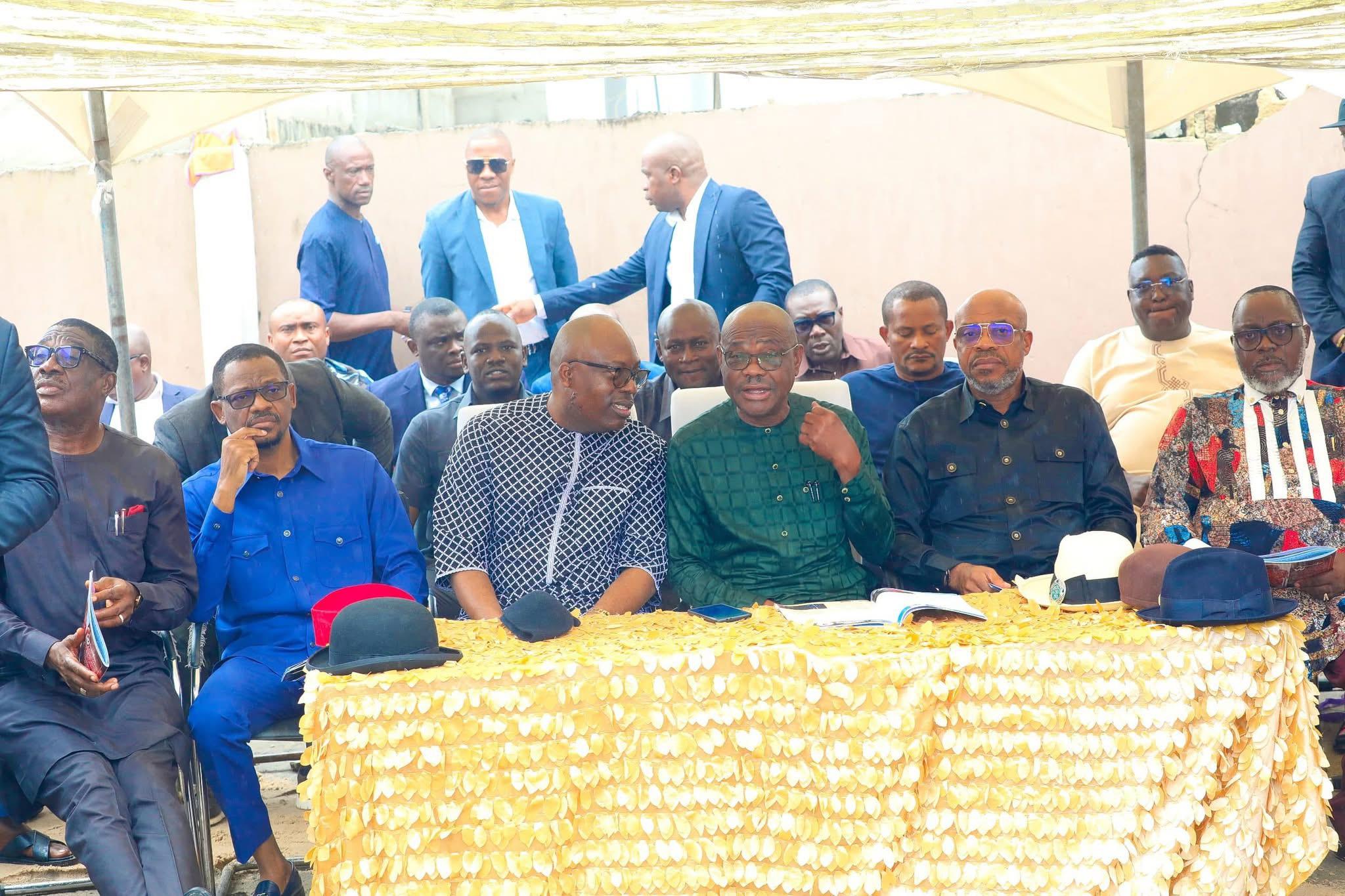
8By Our Correspondent
At last the two years political crisis in Rivers State, following the disagreement between the Minister of Federal Capital Territory, FCT, Nyesom Wike and Governor of the state, Sir Siminalayi Fubara, has finally come to an end, with peace returning to the state.
The reconciliation of the crisis that gave rise to the peace in the State was resolved on Thursday following a peace meeting brokered by President Bola Tinubu between Barr. Nyesom Wike and Governor Siminalayi Fubara at the Presidential Villa in Abuja.
After the closed door meeting with the President, both Wike and Fubara said they have reconciled their differences and have both agreed to work together as one political family, in the interest of the state.
The two Rivers’ political leaders on Saturday showed signs of commitment to have truly buried their hatchets as they both attended their first public function together in almost two years, with Governor Fubara accompanying his godfather and predecessor, Wike, to the funeral service of his uncle, Elder Temple Omezurike Onuoha, at the weekend.
The FCT Minister, Nyesom Wike had, after after the peace meeting with the president said the Thursday resolution was final, adding that “every thing is over.”
Wike said, “We have agreed to work together with the governor, and the governor has agreed to work together with all of us.
“We are members of the same political family. Just like humans, sometimes you have disagreement and then you also have a time to settle your disagreement, and that has been finally concluded today.
“We have come to Mr. President, that this is what we have agreed. So, for me, everything is over and I enjoin everybody who believe to work with us to also work together with everybody.
Fubara also confirmed that the crisis between him and Wike has been resolved. He described the truce as divine intervention, very crucial moment and a turning point for Rivers State.
“It is very important that this day has come to be. What we need for the progress of Rivers State is peace, and by the special grace of God, this night, with help of Mr. President and the agreement of leaders of the state, peace has returned in Rivers State.
“We will do everything within our power to make sure that we sustain it this time around.”
Our Correspondent gathered that the attendance of both Governor Fubara and FCT Minister Wike, alongside the Speaker of the Rivers State House of Assembly, Rt. Hon. Martins Amaewhule, at the funeral service of Wike’s uncle in Port Harcourt at the weekend highlights their ongoing efforts towards a genuine reconciliation and return of peace to Rivers State.
In the wake of the service, Governor Fubara met with key stakeholders and supporters of the FCT Minister, reaffirming a shared commitment to unity and lasting peace within the state. He assured them, and indeed all citizens of Rivers, that the peace achieved is now firmly established.
Governor Fubara said, “Together, we will build a stronger and more united Rivers State.”
Addressing his supporters at the Simplified Movement Office in Port Harcourt, shortly after meeting with Wike’s loyalists, Governor Fubara reassured his supporters that every step he has taken, including the recent reconciliation with the FCT Minister, Nyesom Wike, was done with their collective interest in mind.
He acknowledged the anxiety and disappointment felt by many of his loyalists following the peace deal, but insisted that difficult times call for difficult decisions. But explained that at every stage, consultations were held with key stakeholders and trusted allies within his political family.
The Governor posited that even amid the political turbulence, no one can genuinely dismiss in a hurry, the pivotal role played, the risks taken and sacrifices made by the FCT Minister, Wike, in his emergence as governor of the State, therefore, declaring that for that reason, no sacrifice or concession is too big for him and anyone who genuinely believes in him to make for the peace, stability, and progress of Rivers State.
He admitted that the new political realities may be painful temporarily for some, especially those who have stood firmly with him through the turbulence, but emphasized that the larger goal remains the peace and stability of Rivers State.
According to him, “One thing is important: we have to be alive before we can be hopeful. So, the key is that we are alive and there is hope.
“On May 29, I did inform you that we are in the peace process; and that it is ongoing. I can confirm that some of the pictures you have been seeing on social and conventional media are the outcome of the peace process. I called for this meeting to address you formally so you can have first-hand information on the peace process.”
Governor Fubara also lamented the impact the political crisis has had on governance, pointing out that several development projects and programmes across the state have suffered delays. He, however, expressed optimism that with the reconciliation achieved, the pace of project implementation would soon pick up.
He reminded the people of the State that now is the time to prove their loyalty and trust in his leadership, even when immediate political rewards seem uncertain.
He said, “If you genuinely believe in this struggle, you will know that we have done what we need to do. At this point, if you want to be truthful to yourself, you will admit that the only solution is peace. I have said it repeatedly that there is no price too big to pay for peace in the State. I meant it. And I am still ready to follow through on it to the end.”
Reiterating his commitment to peace, Governor Fubara disclosed that President Bola Tinubu had personally intervened, giving a clear directive that both he and Wike must reconcile for the sake of Rivers State.
He said, “In one of the meetings with Mr President, he clearly said: ‘I want you and your Oga to settle’. Nobody can take away the role he played. Nobody here can say he or she does not know the risks he took, and sacrifices he made. And if today, there is need for us to settle, why shouldn’t we settle for the peace and progress of the State? It is the right thing to do. And I am committed to it.
“You cannot take away the fact that he may be feeling hurt. He is a human being. So, I know how it feels. And if he says, because of what I have gone through, these are things I want. Of course, I will give it to him so we can have peace. We have to make tough sacrifices and concessions for the peace of the State,” he added.
In a passionate appeal, the Governor urged all who believe in his leadership and vision to embrace peace and allow the state to recover and take a leap to the next level.
RIVERS PEOPLE REACTS
Meanwhile, Rivers residents and stakeholders have reacted differently to the reconciliation between the FCT Minister, Nyesom Wike and Governor Fubara, his successor and incumbent Governor who is currently suspended, alongside his Deputy, Professor Ngozi Odu and members of the Rivers State House of Assembly, following declaration of emergency rule in Rivers State by President Bola Tinubu on March 18, 2025, citing growing insecurity and tensions in the state, and appointed retired Vice Admiral Ibok-Ete Ibas as Sole Administrator of the state for an initial six months.
Before the declaration of State of Emergency in the state in March, 2025, the executive and the legislative arms of government in Rivers State have been engaged in a heated political crisis since 2023.
The crisis escalated on October 30th, 2023 after a failed impeachment attempt against the governor by 27 out of 31 lawmakers loyal to the FCT Minister, Nyesom Wike. This incident occured a day after the assembly chambers was hit with a dynamite explosion by yet to be identified arsonists.
Governor Fubara responded swiftly by demolishing the Assembly Complex citing a crack on the building following the incident, and ordered temporary relocation of legislative functions to government house. But the directive failed, as the 27 pro-Wike lawmakers led by the Speaker, Rt. Hon. Martin Amaewhule instead, decided to be operating from the Assembly quarters.
Four members of the Assembly loyal to Governor Fubara, who were suspended before the failed impeachment attempt on the governor, later reconvened, elected the Leader of the House, Edison Ehie as Speaker.
The crisis later metamorphosed to the controversial defection of the 27 pro-Wike lawmakers from the People’s Democratic Party, PDP, to the All Progressive Congress, APC, in December 2023, which led to their non-recognition by the government of Governor Fubara, and sticking to the remaining four members led by Edison Ehie, who eventually in December 2023, passed the much talked about N800 billion 2024 budget.
The Speaker of the pro-Fubara led lawmakers, Edison Ehie, later resigned, and was appointed Chief of Staff to the governor, while lawmaker representing Bonny Constituency, Victor Oko-Jumbo replaced him as speaker.
In December 2024, the 3-member Oko-Jumbo led pro-Fubara Assembly passed the N1.88trillion as 2025 Appropriation Bill, and was signed by the governor, in January 2025, but the budget was later nullified by the February 28, 2025 Supreme Court rulling which ordered Governor Fubara to re-present the budget.
The Apex Court also nullified the October 5th, 2024 local government election conducted by Governor Fubara, and recognized the Martin Amaewhule led 27 pro-Wike lawmakers as authentic members of the Rivers State House of Assembly.
Reacting to the recent reconciliation of the FCT Minister and Governor Fubara, a former Commissioner for Empowerment and Employment Generation in Rivers State, Dr Leloonu Nwibubasa, doubted the genuineness of the reconciliation, and expressed worries over the absence of Governor Fubara’s supporters, especially his Chief of Staff, and three other Assembly members that were seriously involved in the crisis.
The ex-commissioner said the truce between Wike and Fubara in Abuja on Thursday was not reconciliation but a surrender.
He described the development as vicious, alleging that Wike only succeeded in cowing the governor to submission.
He said, “What I see is not reconciliation. What I see is a surrender. In a reconciliation, parties come with their supporters and discussions are made, concessions are made. Where Governor Fubara walked alone to the Presidency without a single of his own supporters, not his deputy, not his Secretary to the State Government, not his Chief of Staff, not his factional Speaker, Victor Oko-Jumbo, and others.
“On the other hand, Wike went with his entire House of Assembly loyalists and elders and you say they went for reconciliation. No, I think Governor Sim was called to surrender and he did.
“And the composition of that visit to Mr President is a story itself and it tells you to what extent these very divisive and vicious Abuja politicians have gone to cow the governor into a surrender”
Nwibubasa expressed worries that with the development, Rivers State will return to the trenches. “What it behoves for Rivers people is clear, that the political structures, economic structures and realm of leadership of Rivers State have returned to the old order,” he added.
Also, a political pressure group, the Rivers Emancipation
Movement, REM, has accused Governor Fubara of betraying Rivers people who stood by him by not carrying them along in the peace process.
The group in a statement issued by it’s National President, Zoe Tamunotonye, at the weekend said the reconciliation was not in the interest of the people of the state. He stressed that any resolution that massaged the ego of a few selfish individuals and undermined the collective interest of Rivers people will not stand.
The statement reads in part, “This development marks the second Abuja- brokered reconciliation attempt. The first failed to yield any meaningful resolution or address the real causes of the political tension that has paralyzed governance and destabilised peace in Rivers State.
“REM unequivocally frowns at this so-called reconciliation in its entirety. It is nothing more than a hollow, self- serving political arrangement that prioritises the narrow interests of a few political actors while completely ignoring the collective pain, sacrifices, and aspirations of the Rivers people.
This is not reconciliation-it is a calculated collusion that will fail again.”
On his part, a Political Analyst and Professor of Politics and Governance at the state owned Ignatius Ajuru University of Education, IAUOE, Rumuolumeni Port Harcourt, Professor, Kenneth Nweke, described the reconciliation between Wike and Fubara as sigh of relief for Rivers State and her residents.
Nweke, who said all well meaning people of Rivers State should be appreciating God for the development, however warned that the reconciliation should not be at the detriment the people.
He said, “Its a sigh of relief. We applaud what happened on Thursday, but it should be handled with a lot of caution on the part of the two gladiators and their followers to understand that Rivers State means a lot to all of us and not a few people.
“What I mean is that, this sigh of relief we are heaving today, should not be at the detriment of the people of Rivers State.
“Of course if this is not handled well, that would mean that these gladiators will be on one side and the people of Rivers State will be on the other side, and that can also determine the position in 2027, because we will have over five million voters against a few gladiators. No one man, or few men determines what happens or should happen in a state as treasureable as Rivers State.”
The University Don, however hinted that the development might signal a quicker return of Governor Fubara, his deputy and members of the State House of Assembly from their initial six months suspension, ensure a smooth governance, and also set up a good relationship between the executive and the legislature, as well as the FCT Minister and his other supporters.
Politics
Rivers Assembly Speaker, 16 others dump PDP for APC
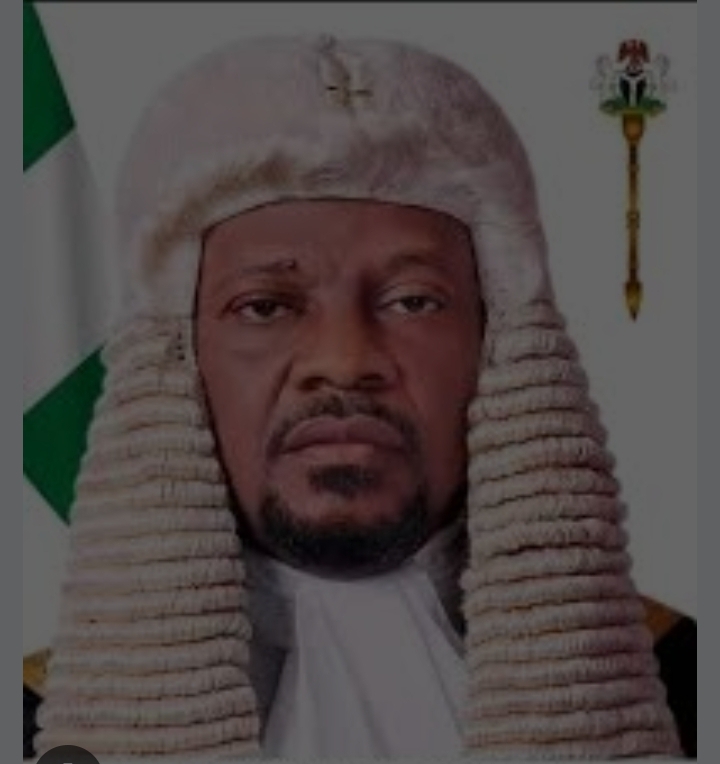
By Our Correspondent
Seventeen members of the 10th Rivers State House of Assembly, on Friday, defected from the Peoples Democratic Party (PDP) to the All Progressive Congress (APC).
The lawmakers announced their defection during plenary on Friday, December 5, 2025 at the Auditorium of the Assembly quarters currently used as the hallowed chambers.
The defected lawmakers, led by Speaker of the House, Martin Amaehwule, cited the division in the PDP at the national level as the reason for their defection, noting that the situation has made the future of the party “hazy and nebulous”.
Among the lawmakers who defected to the All Progressive Congress were; the Speaker, Martin Amaewhule, Deputy Speaker, Dumle Maol, Majority Leader, Major Jack, Deputy Majority Leader, Linda Somiari- Stewart, Chief Whip, Hon. Frankline Nwabuchi, and the Deputy Whip, Hon. Ofiks Kabang.
Others are; Hon. Peter Abbey, Smart Adoki, Igwe Aforji, Arnold Davids, Enemi George, Tekenari Granville, Christian Nwankwo, Gerald Oforji, Azeru Opara, Lolo Opuende, and Hon. Solomon Wami.
Recall that the Speaker, Martin Amaehwule had in December 2023, in the heat of the over two years political crisis in the state, led all 27 members of the Assembly loyal to the FCT Minister to the APC but later denied their defection, and returned to the PDP.
Meanwhile, the PDP which is now the minority party in the House with 9 members, has constituted their officers with Hon. Sylvanus Nwankwo emerging the Minority Leader, Hon. Barile Nwakoh was elected Deputy Minority Leader, Hon. John Dominic Iderima, Minority Whip, and Hon. Justina Emeji, Deputy Minority Whip.
The Assembly has also renewed its earlier call on the State Governor, Sir Siminalayi Fubara to forward his list of Commissioner-nominees to the House for screening and confirmation in line with the 1999 Constitution; regretting that “the State is yet to have the complement of a full cabinet.”
The Assembly also reaffirmed its earlier resolution made on the 14th of December, 2023, and adopted the auditorium at the State House of Assembly quarters as its legitimate and lawful Chamber for the conduct of legislative businesses for the life of the Tenth Assembly of the State.
Speaker of the Assembly, Martin Amaehwule in his speech lauded President Bola Tinubu for his purposeful and exceptional leadership and pledged their support to the APC and the President.
Politics
Sulu – Gambari , Ita Enang , Dambazzau , Ibas Ibok -Ete, 61 others make Tinubu’s Ambassadorial list
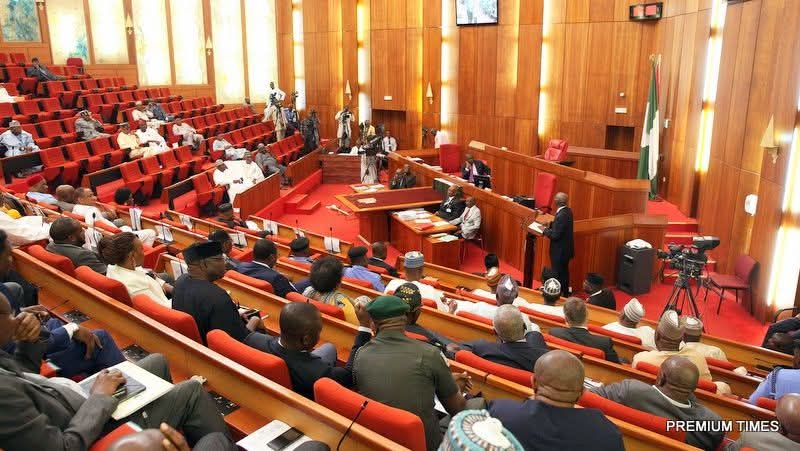
By George Mgbeleke
The Senate Thursday received requests for confirmation of nominations of 65 Ambassadorial nominees from President Bola Ahmed Tinubu.
The nominees as read from two different lists by the President of the Senate , Godswill Akpabio during plenary, fell into two categories of 34 Career Ambassadors and High Commissioners and 31 Non – Career Ambassadors and High Commissioners designate .
Notable names among the 34 Carrer Ambassadors and High Commissioners are Ambassador Sulu – Gambari Olatunji Ahmed from Kwara State , Ambassador Ahmed Mohammed Monguno from Borno State , Ambassador
Maimuna Ibrahim from Adamawa State etc .
Notable in the list of Non Career Ambassadors and High Commissioners are Senator Solomon Ita Enang from Akwa Ibom State , Vice Admiral Ibas Ibok – Ete from Cross River State , Ex Chief of Army Staff, Abdulrahaman Dambazzau from Kano etc .
President Tinubu in the requests hinged on section 171 sub section 1, 2 and 4 of the 1999 Constitution , sought for expeditious consideration of the nominees .
Accordingly, the President of the Senate, forwarded the requests to the committee on Foreign affairs for screening and report back within one week .
Recall that President Tinubu had earlier forwarded to the Senate , three ambassadorial nominees last week for appointment confirmation .
The three earlier nominees , namely
Kayode Are ( Ogun State), Aminu Dalhatu ( Jigawa) and Ayodele Oke ( Oyo State ), were screened on Wednesday by Senator Abubakar Sani Bello ( Niger North ) led committee .
Full list of the Ambassadorial nominees per state reads : ” Ambassador Ezenwa Chukwuemeka ( Abia ) Maimuna Ibrahim ( Adamawa ), Monica Ogochukwu ( Anambra) ,
Ambassador Mohammed Mahmoud Lele ( Bauchi) ,
Endoni Sindo ( Bayelsa) and Ambassador Ahmed Mohammed Minguno ( Borno ) .
Others are Jane Adams Okon Michael ( Cross River ), Clark Omeruo Alexandra ( Delta ), Chimma Geofrey Davies ( Ebonyi) ,
Oduma Yvonne Ehinose ( Edo State ), Wasa Segun Ige ( Edo State )
Ambassador Adeyemi Adebayo Emmanuel ( Ekiti ), Ambassador Onaga Ogechukwu Kingsley ( Enugu ) and
Magaji Umar ( Jigawa) .
Other nominees in the category of Career Ambassadors are
Mohammed Saidu Dahiru ( Kaduna ) ,
AbdulSalam Abus Zayat ( kano) ,
Shehu Barde ( Katsina ) , Aminu Nasiu ( Katsina ),
Abubakar Musa Musa ( Kebbi) ,Mohammed Idris ( Kebbi) ,
Bako Adamu Umar ( Kogi ) ,
Sulu Gambari Olatunji Ahmed ( Kwara ),
Ramata Mohammed ( Lagos ), Shaga John Shama ( Nasarawa )
Salau Hamza Mohammed ( Niger ) and Ibrahim Danlami ( Niger ) .
Others are
Adeola Ibrahim Mopelola ( Ogun) ,
Ruben Abimbola Samuel ( Ondo),
Akande Wahab Adekola ( Osun) ,
Adedokun Esther ( Oyo) ,
Gedagi Joseph John ( Plateau ) ,
Luther Obomode Ayokalata ( Rivers ),
Danladi Yakubu Yaku ( Taraba ) and
Bello Dogondaji ( ( Zamfara ) .
Names on the list of the 31 Non – career ambassadorial nominees are
Senator Grace Bent ( Adamawa ) , Senator Eta Enang ( Akwa – Ibom),
Nkechi Linda Okocha ( Anambra ),
Mahmud Yakubu ( Bauchi )
Philip K. Ikurusi ( Bayelsa ) ,
Paul Oga Adikwu ( Benue ),
Vice Admiral Ibok-Ette Ibas rtd ( Cross River ),
Hon. Abasi Braimah ( Edo ) and
Erelu Angela Adebayo Ekiti )
Others are Barrister Olumilua Oluwayimika Ayotunwa ( Ekiti ),
Rt. Hon. Ifeanyi Ugwuanyi ( Enugu State ) ,
Barr. Mrs. Chioma Ohakim ( Imo State ),
Lt. Gen. Abdulrahman Bello Dambazau (rtd.) ( Kano State ),
Hon. Tasiu Musa Maigari ( Katsina ) ,
Alhaji Abubakar Sanusi Aliyu ( Kogi) and
Olufemi Pedro ( Lagos State ) .
Others are
Barr. Mohammed Ubandoma Aliyu ( Nasarawa ),
Senator Jimoh Ibrahim ( Ondo), Ambassador Joseph Sola Iji ( Ondo ),
Fani-Kayode ( Osun ) , Professor O. Adewole ( Osun) , Florence Ajimobi ( Oyo ), Lola Akande ( Oyo), Professor Nora Ladi Daduut ( Plateau) , Yakubu N. Gambo ( Plateau ) , Chukwujinka Okocha ( Rivers ) , Haruna Abubakar ( Sokoto ) , Rt Hon Jerry Samuel Manwe ( Taraba ) and Adamu Garba Talba Nangree ( Yobe State ) .
Politics
Kano Guberpoll: Former LG chairmen adopt Sen Barau as APC’s sole candidate for 2027

By George Mgbeleke
Former local government chairmen in Kano State have adopted the Deputy President of the Senate, Senator Barau I. Jibrin, as the sole candidate of the All Progressives Congress (APC) for the 2027 governorship race in the state.
The former LG chairmen who served between 2019 and 2022, during the era of Dr Abdullahi Umar Ganduje as Governor of the state, adopted Senator Barau during a courtesy call to the National Assembly in Abuja on Wednesday.
A motion for the adoption of Senator Barau was moved by the former chairman of Rimin Gado Local Government Area, Barrister Dahiru Mannir Maigari, and seconded by the former chairman of the Association of Local Government of Nigeria (ALGON) in the state, Hon. Baffa Mohammed Takai.
When the former chairman of Madobi LGA, Alhaji Mohammed Yahaya, put the vote, all the former chairmen unanimously approved it through a voice vote.
Two members of the Kano State House of Assembly, Hon Zubairu Hamza Masu (Sumaila) and Hon Garba Yau Gwarmai (Tsanyawa/Ghari), witnessed the event.
A statement by the Special Adviser to the Deputy President of the Senate on Media and Publicity, Malam Ismail Mudashir, said that after the voice vote, the local government chairmen appealed to Senator Barau to declare for the governorship race as soon as possible.
Former chairman of Gwale LGA. Alhaji Khalid Ishak Diso informed the Deputy President of the Senate that the people of Kano, especially at the grassroots level, are eagerly awaiting his declaration for the race.
” Kano people are waiting for you to declare for the governorship race. We recently organised an event, where we asked you to declare. You are yet to. The people of Kano are anxiously awaiting your declaration. When are you declaring? Please answer the call to serve our people,” he said.
Also, the former Chairman of ALGON, Baffa Mohammed Takai, who led his colleagues on the courtesy call, said they adopted Senator Barau in view of his outstanding performance in parliament, adding that his contributions to Kano’s development are immense.
” We are here to throw our weight behind you. We are 100 per cent with you. Insha’Allah, you will be the next governor of Kano State, come May 29, 2027. You have the capacity to address the challenges facing our state,” he said.
Responding, the Deputy President of the Senate thanked the former local government chairmen for their support, describing them as grassroots politicians.
“It’s indeed true that Kano was second to Lagos before, in terms of development, in terms of commerce and so on. Unfortunately, Kano is now trailing behind due to a lack of good leadership. Let us not live in denial. This is a fact that we must all work together to address in the interest of our people and state.
“I wish to assure you that by the grace of God, we will take bold steps to bring Kano back to its glorious days. We will succeed by the grace of God. We will always stand by the truth and for our people,” he said.
* Tsanyawa, Ghari stakeholders endorse Barau
Meanwhile, stakeholders from Tsanyawa and Ghari LGAs of Kano State have also thrown their weight behind Senator Barau’s candidature during their visit to him on Wednesday.
A member of the Kano State House of Assembly, Hon. Garba Yau Gwarmai, representing Tsanyawa/Ghari, moved the motion, which Hon. Aminu Yakanawa seconded. A thunderous ovation from over 100 stakeholders in attendance followed the announcement of the endorsement.
Yakanawa told the Deputy President of the Senate that the people of the two local government areas are solidly behind him.
” By the grace of Allah SWT, you are the next governor of Kano State. Our people are solidly behind you, and we are committed to supporting you,” he said
Responding, Senator Barau thanked them for the support, saying the massive support from all the people of the state is a signal of what will happen in 2027.
On the security challenges facing some parts of Tsanyawa and Shanono LGAs, he said, ” We are not leaving any stone unturned in tackling this challenge. We are working underground to bring an end to it. We have taken all the necessary steps. It is not something that we go to radio stations to announce.”
-

 Business & Economy4 months ago
Business & Economy4 months agoPC-NCG Issues Disclaimer on Purported Nigerian Coast Guard National Orientation Exercise In Anambra State
-

 Entertainment1 year ago
Entertainment1 year agoJubilation galore as Parishioners of CKC Kurudu celebrate their cultural heritage ….FG should exploit our Cultural heritage to unite Nigerians-Rev Fr Dim
-

 Law & Crime6 months ago
Law & Crime6 months agoICPC pledges to collaborate with FIDA to end Sex for Marks in tertiary institutions
-

 General News1 year ago
General News1 year agoCelebration galore as UDA Successfully Elected New Exco ……I will digitalize processes that will raise UDA to greater height -Comr. Okejiri
-

 General News2 years ago
General News2 years agoReps hold public hearing on FMC Ugwuaji Awkunanaw
-

 Law & Crime5 months ago
Law & Crime5 months agoLegal practitioner raises alarm over threat to his life by CSP Muhammed Abdulkareem
-

 General News1 year ago
General News1 year agoKugbo Hill Tragedy: Trailer Crushes Car, Kills Four and Injures Several Others in Abuja
-

 Politics3 months ago
Politics3 months agoASUU-NDU protest against FG loans, unpaid salaries,Non-Implementation of agreements …..says loans is generational slavery

